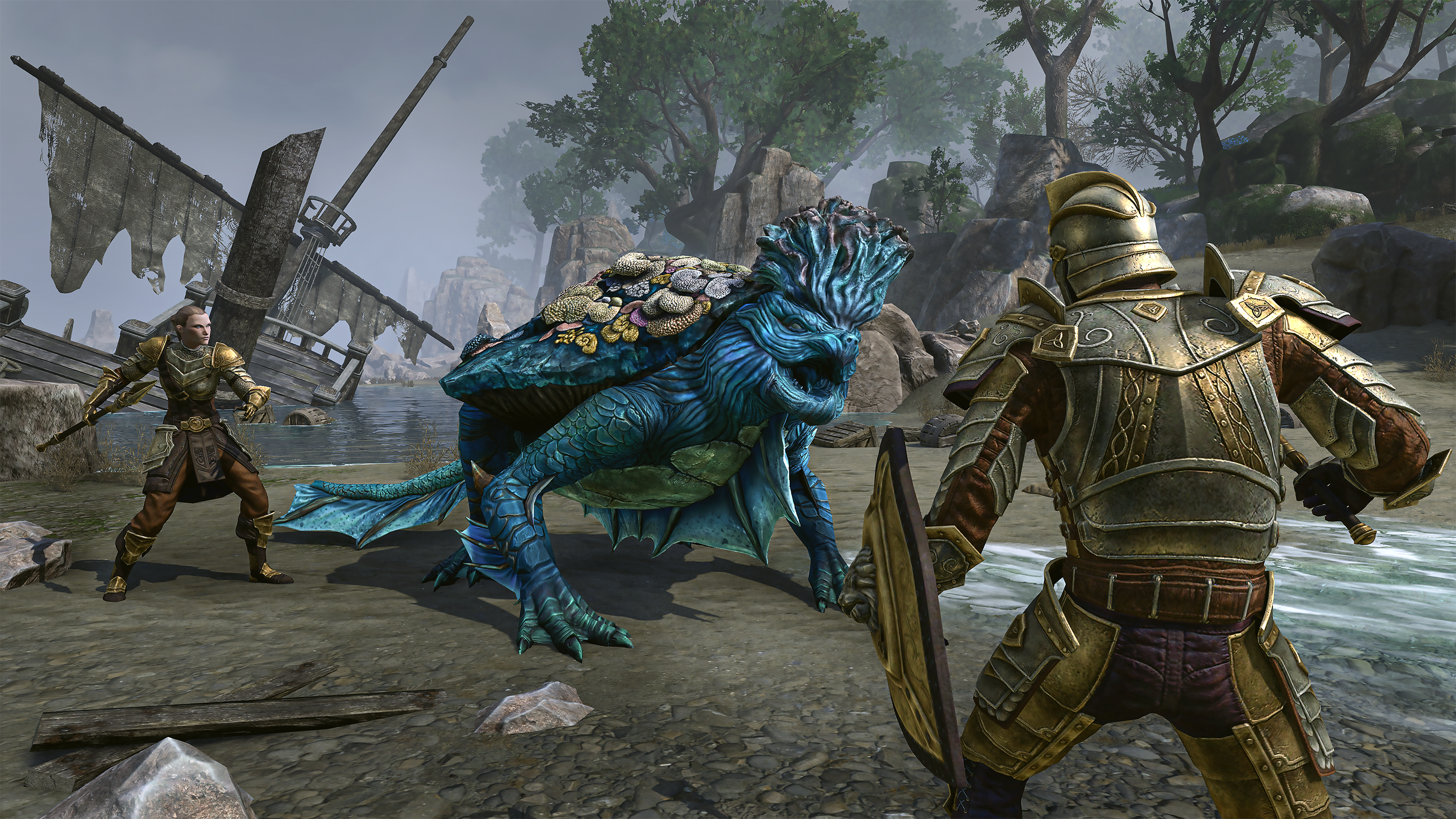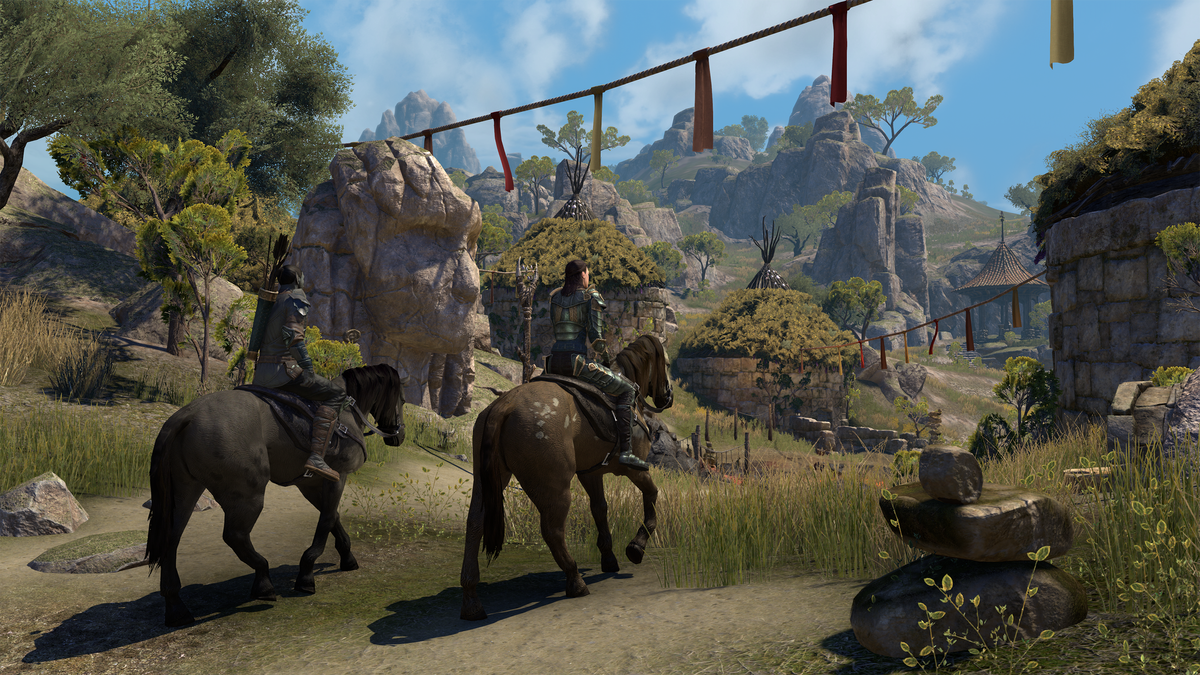The Elder Scrolls Online: High Isle is the MMO’s upcoming chapter set on a lush getaway island nobles travel to for vacation; its narrative involves political intrigue and the chaos caused by The Ascendant Order. This may sound compelling to fans of the series, but as someone who hasn’t played The Elder Scrolls Online before, and never finished a single game in this franchise, it seemed like nothing but jargon. I had no idea what to expect outside of minimal experience as a kid playing through some of Oblivion and Skyrim.
Essentially, I’m an Elder Scrolls noob. But the detail that piqued my curiosity (and the reason I tried this preview to begin with) had to do with Creative Director Rich Lambert’s assurance that High Isle is for all players. “You don’t have to level up and grind your way through 8+ years of previous content just to get to the new stuff,” said Lambert. “You could just jump right in and start playing.”
As someone who spent 70+ hours on Final Fantasy XIV: A Realm Reborn, but hasn’t gotten to a single one of the game’s expansions, this spoke to me. The ability to jump right into the latest chapter and get a feel of the modern content without having to do research for hundreds of hours of quests made this preview worthwhile.
Don’t get me wrong, I’m experienced with MMOs. I’ve played an absurd amount of World of Warcraft, and put decent time into Wildstar, Guild Wars 2, DC Universe Online and Maplestory. I’ve also tried New World, Star Wars: The Old Republic, Lost Ark and am in the middle of getting through Final Fantasy XIV. This isn’t my first rodeo, but I certainly didn’t expect The Elder Scrolls Online to feel so different.
The Elder Scrolls Online: High Isle launches on June 6 on Stadia and Steam PC/Mac, but it launches on June 21 for PS5, Xbox Series X|S, PlayStation 4 and Xbox One. It’ll be $39.99 if you already own the base game and its previous chapters, but will cost $59.99 for the collection that bundles the base game and all of its previous expansions.
Distinct interactivity
How the player interacts with The Elder Scrolls Online in its moment-to-moment establishes its own identity among other MMOs I’ve played. High Isle threw me into a town where I spent an hour walking around talking to people. I rolled a Nightblade, which gave me access to stealthy abilities to sneak into shops or homes to steal whatever seemed interesting.

If this were World of Warcraft, players would be expected to run around and kill things, often for no reason. Final Fantasy XIV focuses on dialogue, but it’s more about a linear story plot. With The Elder Scrolls Online, I felt like I was in an actual town that could react to my actions, especially if a guard caught me doing something illegal. This small area had characters to talk to rather than just quest givers, and due to how it zooms in for a face-to-face conversation with NPCs (where the player can make a few dialogue choices), these characters felt present and organic.
After running a few errands in town, I decided to run off into the jungle to look for some volcanic vents that needed closing. In my first combat encounter with a Jailer Darkblade, I didn’t expect The Elder Scrolls Online to have such an active combat system. Players can attack, dodge and block as inputs within a fight — a foil to World of Warcraft’s method of having a player auto attack and the ability to evade or block are percentage chances that automatically go off within a fight. But I also had no abilities. I was pressing the attack button over and over, but I knew that wasn’t right. “Surely this game has abilities,” I thought. But my world crumbled when I opened the character menu.
Ability overload
I was overwhelmed by the amount of stuff I could advance and modify within the progression menus. Player skills aren’t just unlocked through class, but there are also specializations within it, weapon and armor skills, and abilities you can unlock through guilds and crafts. From what I skimmed through, I noticed more than 50 active abilities (and way more passives), and all of the ones I tried had a couple of iterations that slightly shifted their impact.

Yet with a plethora of abilities at my disposal, The Elder Scrolls Online only lets the player have five standard skills and one ultimate equipped at a time. In any RPG, specialization is important for getting a sense of the role you’re playing within the world, but this seems like far too few skills to have active at once (especially considering the amount of stuff you can mess with). It’s also difficult to understand why the player is limited from having more abilities; it’s visually represented by limited hotbar space, whereas World of Warcraft makes it clear you’re tackling different talent specializations that change up class abilities. WoW also has the player juggling dozens upon dozens of abilities at once, which can be overwhelming, but feels far more satisfying to master.
Beyond just skill points, players can increase their Magicka, Health and Stamina attributes with every level up. This one was pretty self-explanatory, but I felt my reality shatter (again) when I entered the Champion System menu. Here were three massive constellations based around Craft, Warfare and Fitness, each of which boasted dozens upon dozens of passive bonuses each. Within those sets are more powerful passives that must be assigned to your character with a constellation allowing four bonuses to activate at once.

This snapshot of how the player could diversify their builds within The Elder Scrolls Online has me overwhelmed, yet excited, to dive into the full game, especially since the guild-based abilities are seemingly acquired by deepening relations with certain organizations. I love the feeling of being on a unique questline that you chose to pursue rather than something the game forced into your hands.
Journeying through High Isle
While I certainly didn’t get to quest much, I enjoyed my journey outside of town, battling Flame Hounds, Wyrms, an Iron Atronach, other demonic entities, and a beast named Vulk’esh as they funneled out of a crater spewing molten lava. However, when I got to the actual volcanic vent that I needed for a quest, I ran around the designated area without anything triggering at any point. Since I’m a noob, I wasn’t entirely sure if I was missing something or if the game was bugged. After all, this is a very early preview and I wouldn’t be surprised if things still needed fixing.

Beyond that, I infiltrated a cavern full of bandits and took down a camp to acquire a sacred idol (although my first attempt had me gloriously perish). I also wandered to a whole other island where prisoners were being forced out into a vicious jungle full of terrifying monsters.
Through these quests, I noticed a solid responsiveness to my commands and movements. Most MMOs I’ve played have an issue where character animations appear detached from the environments. For example, in Final Fantasy XIV, it feels like the player is moving in a different space than the enemies and NPCs of that world, which likely has to do with the massive servers connecting thousands of players together at once. The Elder Scrolls Online, however, had similar responsiveness to a single-player game. This could just be an advantage of the first-person perspective, but it still felt great.
Bottom line
The Elder Scrolls Online stands apart from some other MMOs by giving the player an opportunity to engage with any facet of its world whenever they please, regardless of progression barriers. With very little experience throughout the series, and no time put into the game itself, this newcomer-friendliness appealed to me.
After putting a few hours into The Elder Scrolls Online: High Isle’s preview, this snapshot of Bethesda’s upcoming chapter offers a breathing world with distinct interactivity and a satisfying active combat system boasting an abundance of ability diversity. If you’re like me and are interested in this series, but not sure where to jump in, High Isle is probably what I’ll be tackling at launch.








